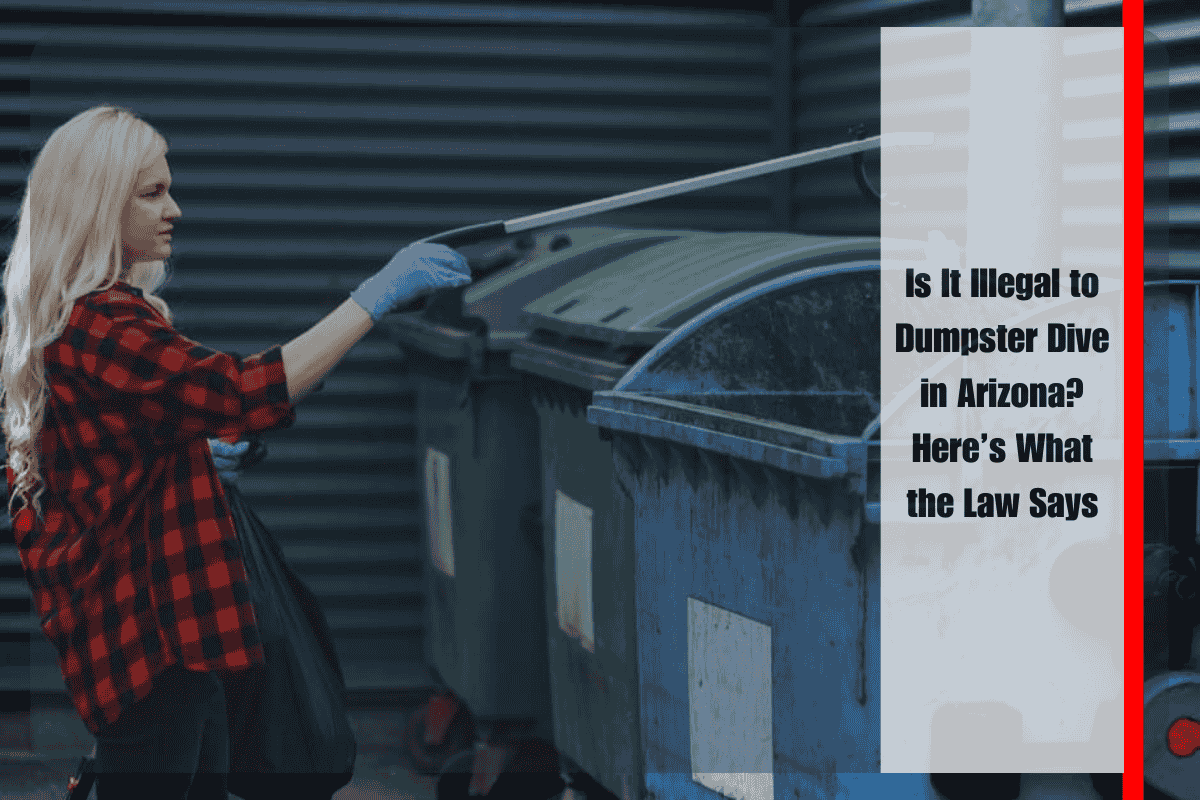Dumpster diving, the act of searching through commercial or residential trash to find usable items, is a practice that raises many questions about legality, ethics, and safety. In Arizona, as in many other states, the rules surrounding dumpster diving can be complex. Whether you’re looking for discarded food, furniture, or other items, understanding Arizona’s laws about dumpster diving is essential to avoid legal trouble.
The Legality of Dumpster Diving in Arizona
In Arizona, there is no specific state law that directly addresses dumpster diving. However, there are several local laws and ordinances that could make dumpster diving illegal in certain areas. The legality of dumpster diving in Arizona largely depends on where you’re diving and how you’re doing it.
Trespassing Laws
One of the main legal concerns when dumpster diving is trespassing. In Arizona, as in most states, dumpster diving is legal only if you’re not trespassing on private property. If the dumpster is located on private property (for example, behind a store or in a gated area), you could be charged with trespassing. Property owners have the right to control access to their property, and if you enter without permission to dive into their dumpster, you could face legal consequences.
In cases where dumpsters are located in public spaces or commercial areas where access is allowed, dumpster diving is generally not considered trespassing. However, always be aware of the surrounding area and any signs or security measures that indicate restricted access.
Theft and Ownership of Trash
Another aspect of dumpster diving is the question of ownership. While it may seem like discarded items belong to anyone who finds them, the law is more nuanced. In Arizona, once something is discarded, it technically becomes “abandoned property.” However, it’s important to note that the owner of the dumpster or trash—whether it’s a business or an individual—still holds rights over the property until it is disposed of through the trash service.
Taking items from a dumpster could be considered theft in some situations, especially if the items are still legally the property of the business or person who discarded them. For example, if you take electronics or goods that are still under warranty, you could potentially face theft charges.
Health and Safety Regulations
Health and safety laws can also play a role in whether dumpster diving is legal. Arizona, like many states, has regulations about food safety. Dumpster diving for food, especially from commercial establishments like grocery stores or restaurants, could expose you to health risks, and businesses may be liable for food safety violations if people take discarded food from their dumpsters. Some cities or counties may even have specific rules regarding discarded food that prohibit people from taking it to prevent health risks.
If you dive for food, it’s crucial to be cautious about what you take. Many businesses or food retailers may have specific disposal procedures for food waste that ensures safety, but taking it without knowledge of these procedures could potentially expose you to health hazards.
Local Ordinances and Business Policies
In addition to state laws, individual cities or municipalities in Arizona may have their own specific rules regarding dumpster diving. For example, Phoenix and Tucson may have ordinances that prohibit or regulate dumpster diving, especially in certain commercial or residential areas. It’s always a good idea to check with local authorities to ensure you’re following the law and not violating any local rules.
Businesses also have the right to set their own policies, and many will have security personnel or cameras monitoring dumpsters to prevent unauthorized access. In some cases, businesses may have specific trash services or contracts that include prohibiting people from taking items from dumpsters.
Legal Consequences of Dumpster Diving in Arizona
The potential legal consequences of dumpster diving in Arizona can vary depending on the circumstances. If you are caught trespassing or taking items from a dumpster that belongs to a private property owner, you may face fines or even criminal charges. Charges can range from misdemeanor trespassing to theft, depending on the value of the items you take.
It’s also important to note that businesses may have private security measures in place to prevent dumpster diving. If you are caught, you could be asked to leave or banned from the property. In more extreme cases, police may be called if security feels that the situation is escalating.
How to Dumpster Dive Legally in Arizona
If you’re interested in dumpster diving but want to stay on the right side of the law in Arizona, here are a few guidelines to keep in mind:
Make sure you have permission: Always get permission from the property owner or business before diving into a dumpster. If you’re unsure, it’s best to ask or avoid the area altogether.
Stick to public spaces: Focus on areas that are legally accessible, such as public dumpsters or community clean-up events where people are encouraged to take items.
Be mindful of health regulations: Avoid diving for food, especially from commercial establishments, as it could violate health codes or expose you to dangerous conditions.
Respect private property: Do not trespass in private spaces or behind gates and fences. If a dumpster is on private property, you must have explicit permission to access it.
In Arizona, dumpster diving is not explicitly illegal, but local laws and property rights play a significant role in determining whether it’s permissible. As long as you are careful to avoid trespassing, theft, and health code violations, dumpster diving in public areas may be allowed. Always check local ordinances and ensure you have permission to access the dumpster to stay within legal boundaries. By following the rules and exercising caution, you can safely participate in dumpster diving without running into trouble.
Sources
[1] https://www.theenvironmentalblog.org/2025/04/is-dumpster-diving-legal/
[2] https://www.rolloffdumpsterdirect.com/dumpster-diving-illegal/
[3] https://worldpopulationreview.com/state-rankings/dumpster-diving-legal-states
[4] https://www.findlaw.com/injury/torts-and-personal-injuries/dumpster-diving.html
[5] https://codelibrary.amlegal.com/codes/sierravista/latest/sierravista_az/0-0-0-14276












